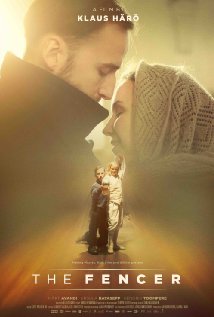The Fencer, Finland's Foreign-Language entry for the 2016 Academy Awards, draws on the real-life story of Estonian fencer and coach, Endel Nelis who fled Leningrad in 1952 to avoid investigation by the Secret Police, and founded a fencing club in Haapsalu, Estonia – a club that still exists today. Nelis had hoped to start a new life in Haapsalu, but in the old Soviet Union suspicion was everywhere, and his past always threatens to catch up with him.
What few people in the west will remember is that in 1941 the German military forcibly drafted Estonians as part of their massive invasion force for Russia, and only 30% of them survived the war. Those Estonians who did survive the German draft and found themselves within the postwar borders of the USSR - including an eighteen year old Endel Nelis - were looked upon by the suspicious Stalinist regime as Enemies of the People, and they were individually hunted and imprisoned by the Secret Police. Nelis’s problems become acute when his fencing students decide they want to participate in an all-Soviet fencing tournament in Leningrad – the very city he had decided to run away from.
The juxtaposition of the children fencing, while the adults are sparring over politics and ideology highlights the pervasive tension that spread across Soviet society.
In a Q & A after the film director Klaus Haro talked about how the Soviet regime made villains out of the common man. “It wasn’t really about being bad or good, in that sense. It was that you couldn’t have a decent normal conversation like “Hi. How are you?” Before answering you would think, ‘Why does he want to know? Why is he asking me? If I say I’m good, will that mean he’s envious and will get me in trouble? But if I say I’m bad, will he think I’m criticizing the system?’ So whatever I say bears some kind of double meaning.” This led to a society where you had to get your sword thrust in before you were attacked by someone else: “The way to survive in such a society was to keep informing, keep all your friends and everybody around you in trouble, and that way you can stay afloat for a while.”
Haro shot The Fencer in just 39 days, quite a feat considering the film covers different seasons and features a young cast who must master new athletic skills during shorter work days. At one point in the filming Haro became irritated when he saw many of his crew were distracted by their phones, and he asked them to take a break from their social media fixation to concentrate on their work. “’No, we’re not on Facebook’,” they told him. 'We’re reading the news. The Russians have just entered Ukraine.’… "To receive this piece of news while shooting this scene was like time travel,” he said.

